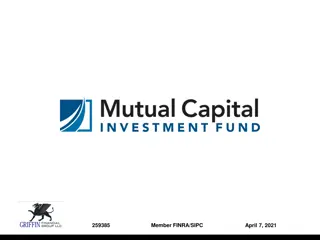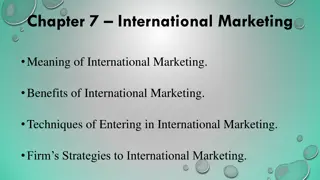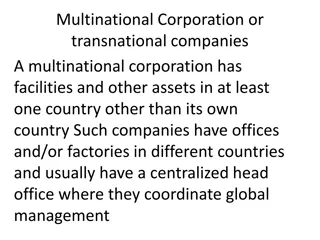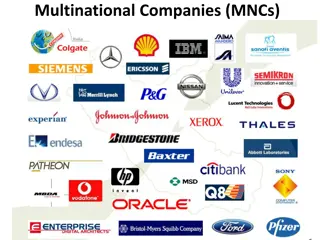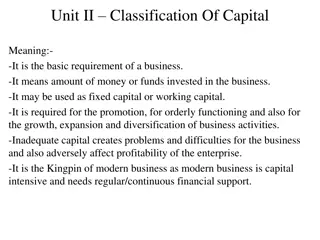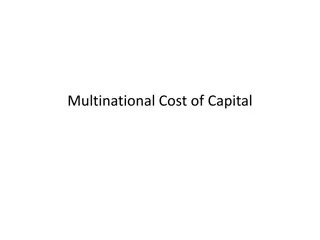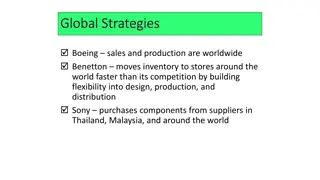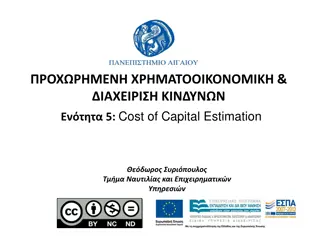Understanding Multinational Capital Structural Decision
Multinational corporations rely on capital to fund their expansion and projects. Capital structure decisions impact the cost of capital, profitability, and overall value. MNCs face complexities in balancing debt and equity for financing operations, choosing markets and currencies, and internationalizing their capital structure to lower costs. The choice between debt and equity financing depends on corporate characteristics and global market conditions.
- Multinational capital
- Capital structure decision
- MNC finance
- Debt vs equity
- International capital markets
Download Presentation

Please find below an Image/Link to download the presentation.
The content on the website is provided AS IS for your information and personal use only. It may not be sold, licensed, or shared on other websites without obtaining consent from the author. Download presentation by click this link. If you encounter any issues during the download, it is possible that the publisher has removed the file from their server.
E N D
Presentation Transcript
Capital Structure Multinational corporations rely on capital to finance their expansion of existing subsidiaries, the creation of new subsidiaries, and other projects. Because the MNC s decisions regarding its capital structure determine its cost of capital and the cost of capital affects the profitability of its projects, the MNC s capital structure decisions affect its value.
Capital Structural Decision Concept In case of an MNC, capital structure decision is concerned with determining the mix of debt and equity for the parent entity and for all consolidated and unconsolidated subsidiaries. As a matter of fact, capital structure decision in an MNC is about striking trade off between using debt and using equity for financing its operations.
Capital Structural Decision Concept The opportunities as well as the complexities of multinational capital strategy are much more complex than those of their domestic counterparts. MNCs have comparatively greater flexibility in choosing the markets and currencies in which it garnishes funds. By assessing unsaturated demand in international capital markets, the MNC can lower its cost of debt and equity capital and thereby increase its value.
Capital Structural Decision Concept In recent years, many major firms across the globe have tended to internationalize their capital structure by raising funds from foreign as well as domestic sources. This tendency has gained further prominence because of a conscious effort on the part of the firms to lower cost of capital by international sourcing of funds but also the on-going liberalization and deregulation of international financial markets accessible for many firms. that make them
Capital Structural Decision Concept Thrust of MNCs is on worldwide capital structure because suppliers of capital to a multinational firm are assumed to associate the risk of default with the MNC s worldwide debt ratio. This association stems from the view that bankruptcy or other forms of financial distress in an overseas subsidiary can seriously impair the parent company s ability to operate domestically.
Capital Structural Decision Concept Choice of debt Vs. equity financing by MNCs depends on corporate characteristics specific to these corporations as well as to the countries where the MNCs have established their subsidiaries.
Character of MNCs Cash Flows An MNC having volatile cash flows can ill afford debt financing because it is not assured of generating adequate cash to service debt periodically. In refreshing contrast to this, MNCs having stable cash flows can manage more debt due to regular flow of earnings.
Character of MNCs Cash Flows MNCs having diversified operations across the globe usually have relatively more stable cash flows because the conditions in a country do not exert major influence on their cash flows. Hence such companies can comfortably have greater financial capitalization. leverage in their
Credit Standing of MNC MNCs enjoying high reputation and low credit risk find it easy to access to cheaper debt. Further, those with marketable assets that serve as acceptable collateral can raise borrowings at reasonable terms. In contrast, MNCs with high credit risk and assets which are not highly marketable are left with no option but to take recourse to equity financing.
Profitability of MNC MNCs operating profitably are in a position to build retained earnings which can be employed to finance their expansion programmes economically. Such corporations have lower degree of leverage as compared to those having small levels of retained earnings. Growth oriented MNCs usually rely on debt financing because of their limited access to retained earnings.
MNCs Guarantees on Debt Where an MNC guarantees borrowings of its subsidiary, the latter is likely to rely less on equity financing. However, the borrowing capacity of such MNCs will tend to decline as suppliers are less willing to supply large funds to the parent if those funds are needed to rescue a parent s subsidiary.
Monitoring of Subsidiary by MNC Where investors of the parent company are finding it difficult to monitor operations of the subsidiary effectively, the latter will be induced to issue equity shares in the local market. This will enable the parent company to monitor the managers to ensure maximization of the firm s stock price. This strategy can affect the MNC s capital structure also. Success of this strategy hinges essentially upon the initiatives taken by the MNC s parent to beef up the image of the subsidiary in the host country.
Current Interest Rates in Host Countries Interest rate on loans varies across countries because of government-imposed barriers on capital flows along exchange rate, tax and country risk effects. with potential adverse As such, MNCs may raise borrowed funds at cheaper rate in some countries than in others thus, MNC s preference of debt financing would depend on availability of loan-able funds at cheaper rate in countries of their operations.
Country Risk in Host Countries Where there is danger of host country government blocking funds to be remitted by the subsidiary to the parent or risk of confiscation of the assets or termination of operation of the subsidiary, the MNC would prefer to use local debt financing. Another alternate financing strategy to cope with a high degree of country risk could be issue of equity stock by the subsidiary within the host country. This move will benefit the local minority shareholders from a profitable subsidiary. Because of the minority interest in a subsidiary, the local investors may offer some protection against the impending threats of adverse actions by the host government.
Taxation in Host Countries Taxation laws existing in a host country do impact the capital structure decision of an MNC, For instance, MNC may direct its subsidiary to rely largely on local debt so as to reduce withholding tax liability on remitted earnings as also to minimize corporate tax liability, especially when tax rates are high. In recent years, MNCs have restructured their capital structures to reduce with-holding taxes on remitted earnings by subsidiaries!
Taxation in Host Countries In brief, MNCs may place greater reliance on debt financing when their cash flows are stable, have high credit standing and limited access to retained earnings. MNCs would like their subsidiaries to take recourse to more of a debt when local interest rates are low, local currency is weak high degree of country risk and tax rates are high.
Strength of Host Country Currency If an MNC believes that currency of host country is likely to appreciate against the domestic currency, it may direct the subsidiary firm to regain larger portion of its earning for funding its operations.
Strength of Host Country Currency Converse will hold true in case of likely depreciation of local currency because the MNC would like its subsidiary to raise debt in local currency to finance its operations. This would, thus, lend to rise in proportion of debt financing in total capitalization of the MNC. The amount of remittance of earnings by the subsidiary to the parent would tend to be less owing to interest payments on local debt.
An MNC needs capital to expand its perations. In general, an MNC can increase its capital internally by retaining earnings or externally with debt or equity. These sources of capital are described in turn.
Retained Earnings An MNC s parent and its subsidiaries commonly generate earnings, which can be retained and reinvested to support existing operations or expansion. There are many different ways in which an MNC might use retained earnings. First, the MNC might allow each subsidiary to retain sufficient earnings to cover its expected operating expenses denominated in the same currency in the near future. This strategy allows each subsidiary to use its recent cash inflows to cover its future cash outflows. Because this strategy minimizes the earnings remitted to the parent and parent financing of subsidiary operations, it minimizes the amount of cash flows between subsidiary and parent that must be converted into a different currency. However, this strategy will not always be a perfect solution because some subsidiaries may need more funding than can be covered by recent earnings. Alternatively, the parent might require that the subsidiaries remit their earnings to cover the parent s operating expenses in the near future. If the parent invested its own cash to create each subsidiary, it may view the remitted earnings as a return on its initial investment in the subsidiary.
The MNC might also use retained earnings to further expand its operations internationally by establishing a new subsidiary in another country, in which it again invests some cash to create an equity investment. This subsidiary uses the cash infusion to develop its business operations, and it will ultimately add to its capital by retaining some earnings and by obtaining loans from local banks. This subsidiary has its own capital structure, which may vary substantially from that of the other subsidiaries and the parent. When an MNC has foreign subsidiaries, its overall (or global ) capital structure is the combination of the capital structures of the parent and all subsidiaries.
Domestic Bond Offering Multinational corporations often engage in a domestic bond offering in their home country in which the funds are denominated in their local currency. They hire an investment bank to help determine the amount of the offering and the price at which the bonds can be sold. The investment bank also provides distribution by selling the bonds to many institutional investors. Maturities on the debt typically range from 10 to 20 years. Investors who purchase the bonds do not have to hold them until maturity because the bonds can be sold to other investors in the secondary market. The proceeds of a domestic bond offering are initially denominated in the parent s local currency. Thus if the parent plans to use a portion of the proceeds to provide financing to any of its foreign subsidiaries, it would convert the funds into the subsidiary s local currency at the prevailing exchange rate.
Global Bond Offering An MNC can engage in a global bond offering (with the help of an investment bank) in which it simultaneously sells bonds denominated in the currencies of multiple countries. The focus is on obtaining funds from a few countries where large subsidiaries are in need of financing. For example, an offering by a U.S.-based MNC may consist of $20 million in bonds sold to U.S. investors to finance its home operations, British pound denominated bonds valued at 15 million British pounds sold to British investors to finance its subsidiaries that conduct business in the United Kingdom, and Swiss franc denominated bonds valued at 10 million Swiss francs sold to Swiss investors to finance its subsidiaries that conduct business in Switzerland. Investors who purchase any of these bonds can sell them before maturity to other investors in the secondary market. The U.S. parent would rely on revenue from its own operations to make coupon payments on the dollar denominated bonds, while the British subsidiaries would use some of their pound denominated revenue to make coupon payments on the pound-denominated bonds and the Swiss subsidiaries would use some of their Swiss franc denominated revenue to make coupon payments on the Swiss franc denominated bonds.
Private Placement of Bonds Another source of debt for MNCs is to offer a private placement of bonds to financial institutions in their home country or in the foreign country where they are expanding. Private placements of debt may reduce transaction costs because the debt is placed with a small number of large investors. However, MNCs may not be able to obtain all the funds that they need with a private placement of debt. Privately placed bonds may carry some restrictions on their resale in the secondary market. Thus they may offer limited liquidity to investors.
Loans from Financial Institutions An MNC commonly borrows funds from financial institutions. It not only benefits from access to funds but also establishes a business relationship with the financial institutions, giving it access to other services such as foreign exchange and cash management. Subsidiaries of an MNC borrow funds from local financial institutions in their respective host country and may also rely on other services from these financial institutions.
Loans from Financial Institutions Loans from financial institutions to MNCs typically specify an adjustable interest rate that changes every six months or every year in accordance with the annualized interbank loan rate (called the London Interbank Offer Rate, or LIBOR) in the same currency. For example, the interest rate on a loan denominated in British pounds may be reset every year for loans denominated in pounds, plus an annualized premium of 3 percent.
Domestic Equity Offering Multinational corporations can engage in a domestic equity offering in their home country in which the funds are denominated in their local currency. They may distribute a portion of the proceeds to their subsidiaries. Any funds transferred to subsidiaries must be converted into the subsidiary s local currency at the prevailing exchange rate.
Global Equity Offering Most MNCs obtain equity funding in their home country, but some pursue a global equity offering in which they can simultaneously access equity from multiple countries. Their efforts in placing the stock are focused on a few countries where they have large subsidiaries that need financing. The stock will be listed on an exchange in the foreign country and denominated in the local currency so that investors there can sell their holdings of the stock in the local stock market. Investors in a foreign country will be more willing to purchase shares in a global equity offering if the MNC places a large number of shares in that country because this ensures a more active and liquid secondary market for the stock in that country. Hence those investors can more easily sell their shares in the secondary market in the future.
Private Placement of Equity Another source of equity for MNCs is to offer a private placement of equity to financial institutions in their home country or in the foreign country where they are expanding. Like private placements of debt, private placements of equity may reduce transaction costs. However, MNCs may not be able to obtain all the funds that they need with a private placement. The funding must come from a limited number of large investors who are willing to maintain the investment for a long period of time because the equity may be subject to conditions regarding its resale.
Subsidiarys Offering of Its Own Stock A foreign subsidiary of the MNC could engage in a public offering of its own stock, assuming that it receives approval from the parent. If shares of the subsidiary stock are sold to investors in the host country, the subsidiary would no longer be wholly owned by the parent, although the parent would likely remain as the majority owner.
Subsidiarys Offering of Its Own Stock If an MNC allows a subsidiary to issue its own stock, the parent may offer the managers of the subsidiary shares of this stock as partial compensation to encourage them to make decisions that maximize the stock s value. However, there is a potential conflict of interest when a foreign subsidiary is partially financed with its own stock and its managers are minority shareholders. These managers may make decisions that benefit the subsidiary at the expense of the MNC overall. For example, they may use funds for projects that are feasible from their perspective but not from the parent s perspective. Although some subsidiaries have issued their own stock, most MNC parents prefer to own all the equity of their subsidiaries. Thus the subsidiary is more likely to increase its equity over time by retaining earnings than by issuing its own stock.







